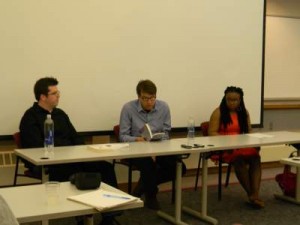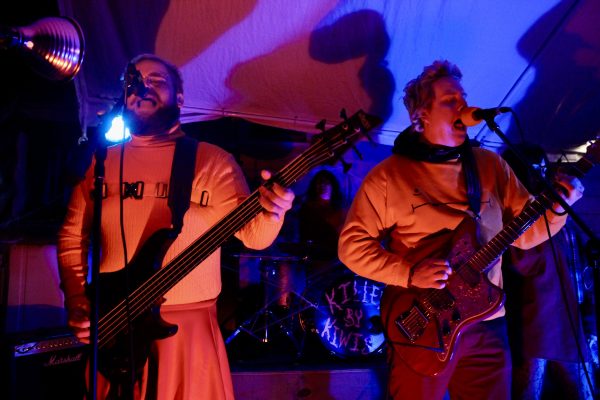Celebrated author visits campus
Visiting ACTC fiction writer Kevin Moffett makes an appearance at Hamline for a reading and interview.
April 22, 2015

A Horse Windbreaker and a Naughty Confessions Holder are some of the items that one can find in author Kevin Moffett’s online shop. The oddly humorous items in this store reflect his funny and critically-acclaimed writing style.
Moffett has appeared in many literary magazines, including the Harvard Review, Tin House and McSweeney’s. He has received the Pushcart Prize, the Nelson Algren Award and the John Simmons Short Fiction Award for his first collection of short stories, “Permanent Visitors.” His most recent collection of short stories, “Further Interpretations of Real-Life Events,” was published by Harper Perennial in 2012.
A diverse audience, including many creative writing majors, attended Moffett’s reading in Klas Center on Tuesday night. Katrina Vandenberg, Associate Professor of Creative Writing and Poetry Editor of Runestone, was excited about Moffett’s visit.
“It’s always a great week when the ACTC visiting writer comes to campus,” Vandenberg said. “And of course we are glad to have someone as talented as Kevin Moffett here this week.”
On Tuesday night, Moffett was introduced by fiction author and Hamline Creative Writing Program faculty member John Brandon. They joked about their mutual upbringings in the state of Florida, and then Moffett read a new short story called “The Sisters,” which resembles a modern-day fairy tale. He said he wrote this story because of the familiar structure and the fact that he got used to telling bedtime stories to his son.
Moffett’s stories are frequently tinged with humor, and the audience at the reading really seemed to enjoy the witty structure of his narratives.
Runestone Editorial Board member Sophia Myerly (‘15) found Moffett’s work spoke to her.
“It’s really a beautiful writing style, because it is very conversational,” Myerly said.
On Wednesday night, Runestone, Hamline’s national undergraduate literary journal, held an interview with Moffett in East Hall. Myerly moderated the interview, while Runestone Editorial Board Members Paul Patane (‘16) and Deziree Brown (‘15) presented the questions. During the interview, Moffett gave a lot of insight into his personal experiences as a writer.
“I thought writing was like tennis and if you learned all the rules you could become good at it,” he said.
About halfway through the interview Brown asked Moffett what effects he wants his stories to have on his readers. Moffett responded that he doesn’t want his readers to get anything specific out of his stories, but that he “…wants them to be sort of moved in some way.” He added, “I want them to feel what I feel when I read something I really like.”
The interview went just over 40 minutes, leaving time at the end for questions from the audience. One question was asked about writing essays. Since Moffett is mainly a short story writer, he explained that nonfiction and essay writing are very enjoyable for him, showing that Moffett can step outside of the fiction genre.
Moffett’s three primary published works are fiction, but he has delved into other genres as well, including essays and nonfiction. He believes that “the bridges between genres are much more imaginary than people take them for.” His novel, “The Silent History,” reflects that sentiment. Moffett co-authored the novel with two other writers, with it originally having been written and designed specifically for the iPad and iPhone.
For more information on Kevin Moffett’s work, head over to www.kevinmoffett.org or pick up his latest short story collection “Further Interpretations of Real-Life Events.”




